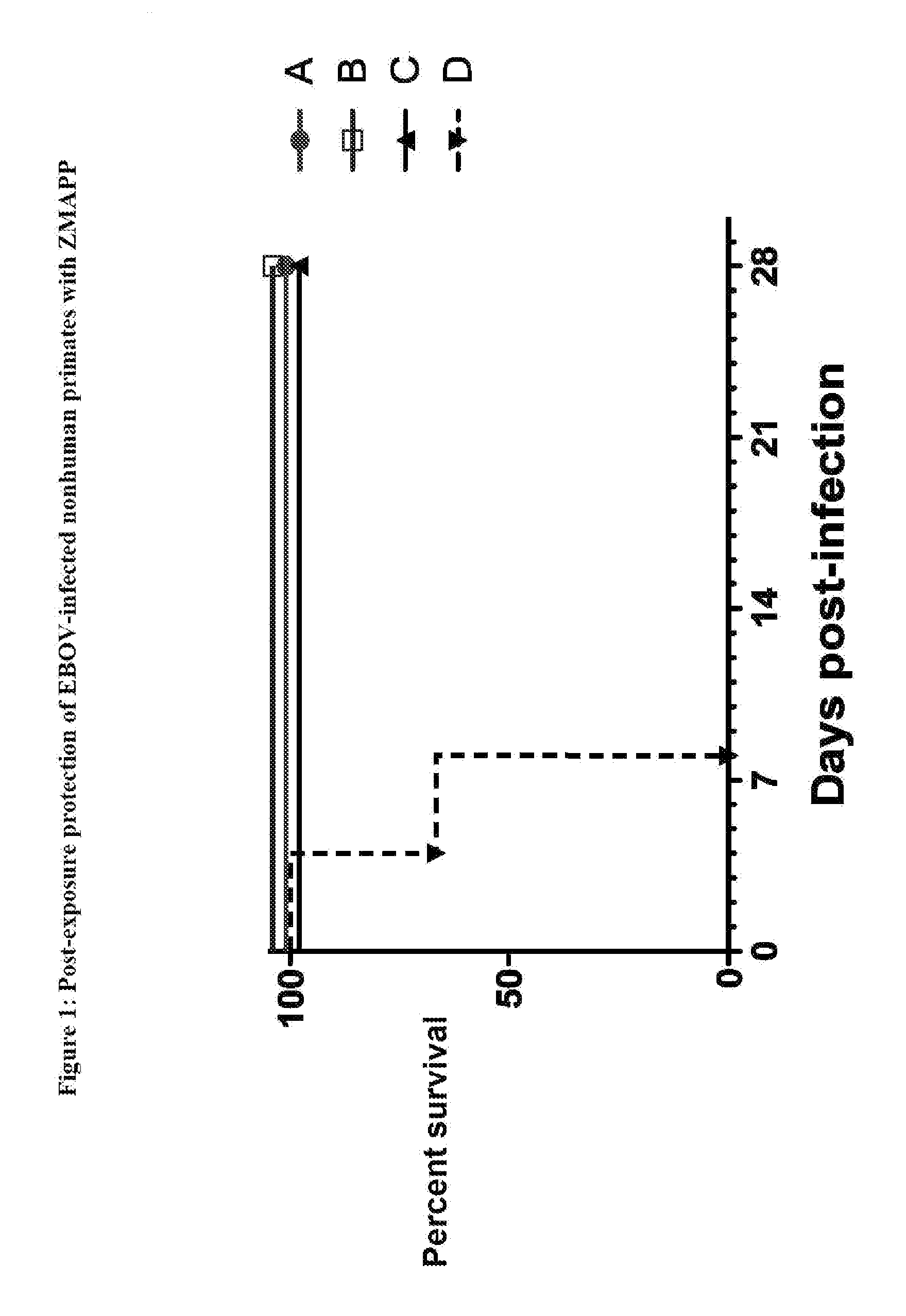Monoclonal antibody cocktails for treatment of ebola infections
- Summary
- Abstract
- Description
- Claims
- Application Information
AI Technical Summary
Benefits of technology
Problems solved by technology
Method used
Image
Examples
example 1
13C6 Bioprocessing
[0111]The 2014 / 2015 Ebola virus disease (EVD) in West Africa was the largest outbreak in history (51). This Ebola virus outbreak appears to have been caused by the Zaire species of the virus, which can have fatality rates up to 90% (24). EVD displays high viral loads that cause immune and vascular dysregulation. Major symptoms include fever, severe headache, muscle pain, weakness, fatigue, diarrhea, vomiting, abdominal pain and unexplained hemorrhaging.
[0112]Currently there are no licensed vaccines or medicines for the treatment of EVD. Infected patients are treated with supportive-care rehydration of oral or intravenous fluids while maintaining oxygen and blood pressure levels. Therapeutic strategies targeting EVD include recombinant human activated protein, recombinant nematode anticoagulant protein c2, small interfering RNA, positively-charged phosphorodiamidate morpholino oligomers, the vesicular stomatitis virus vaccine, and monoclonal antibody (mAb) cocktails...
example 2
Selection of the Best mAb Combinations
Materials and Methods
Ethics Statement
[0162]The guinea pig experiment, in addition to the second and third NHP study (ZMapp1, ZMapp2 and ZMAPP) were performed at the National Microbiology Laboratory (NML) as described on Animal use document (AUD) #H-13-003, and has been approved by the Animal Care Committee (ACC) at the Canadian Science Center for Human and Animal Health (CSCHAH), in accordance with the guidelines outlined by the Canadian Council on Animal Care (CCAC). The first study with MB-003 in NHPs was performed at United States Army Medical Research Institute of Infectious Diseases (USAMRIID) under an Institutional Animal Care and Use Committee (IACUC) approved protocol in compliance with the Animal Welfare Act, Public Health Service Policy, and other federal statutes and regulations relating to animals and experiments involving animals. The facility where this research was conducted in accredited by The Association for Assessment and Accr...
example 3
Deciding Between ZMapp1 or ZMapp2 Using Non-Human Primates (NHPs)
[0180]Rhesus macaques were used to determine whether administration of ZMapp1 or ZMapp2 was superior to ZMAb and MB-003 in terms of extending the treatment window. The experiment consisted of six NHPs per group receiving three doses of ZMapp1 or ZMapp2 at 50 mg / kg intravenously (IV) at 3-day intervals, beginning 3 days after a lethal intramuscular (IM) challenge with 4000×TCID50 (or 2512 PFU) of EBOV-K. Control animals were given phosphate-buffered saline (PBS) or mAb 4E10. Mock-treated animals succumbed to disease between 6-7 dpi with symptoms typical of EBOV, characterized by high clinical scores but no fever, in addition to viral titers up to ˜108 and ˜109 TCID50 by the time of death.
[0181]All six ZMapp1 treated NHPs survived the challenge with mild signs of disease (p=0.0039, log-rank test, x2=8.333, df=1), comparing to control animals. A fever was detected in all but one of the NHPs at 3 dpi, the start of the firs...
PUM
| Property | Measurement | Unit |
|---|---|---|
| Fraction | aaaaa | aaaaa |
| Time | aaaaa | aaaaa |
| Temperature | aaaaa | aaaaa |
Abstract
Description
Claims
Application Information
 Login to View More
Login to View More - R&D
- Intellectual Property
- Life Sciences
- Materials
- Tech Scout
- Unparalleled Data Quality
- Higher Quality Content
- 60% Fewer Hallucinations
Browse by: Latest US Patents, China's latest patents, Technical Efficacy Thesaurus, Application Domain, Technology Topic, Popular Technical Reports.
© 2025 PatSnap. All rights reserved.Legal|Privacy policy|Modern Slavery Act Transparency Statement|Sitemap|About US| Contact US: help@patsnap.com

